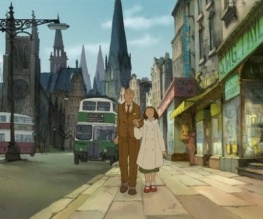The Illusionist

For any fan of Jacques Tati’s idiosyncratic and charming films, the fact that he only made five feature-length pictures is a persistent frustration. However, he wrote at least six, although the unproduced ‘Film Tati Nº 4’, written in 1956, spent half a century languishing in the Paris archives of the CNC before finally coming to light. The catalyst for its rebirth was Sylvain Chomet’s enchanting and Oscar-nominated animation Belleville Rendez-vous, which drew heavily on Tati’s minimalist dialogue and pantomime humor and featured a clip from his first full-length film Jour de Fête. Sophie Tatischeff, Tati’s late daughter, was so impressed with Chomet that although she was unhappy with the idea of a biopic of her father she passed him the script to what become L’Illusionniste.
Originally set in Prague, The Illusionist is a traditional animation brought to life with all the elegance of Chomet’s previous work and more emotional depth than any of Tati’s live-action performances. It follows the ageing stage magician M Tatischeff, a variety act who is gradually being pushed offstage by the slicker performances of modern pop and rock musicians, as he travels further and further afield in the hope of finding an unjaded audience receptive to his old-fashioned performances. Along with his magic hat, a carefully preserved poster and a very ill-tempered rabbit, Tatischeff eventually finds himself in a remote Scottish village where he attracts an unexpected fan – a young woman who believes him to be a true magician. The unlikely pair end up in Edinburgh, where L’Illusionniste is forced to stretch himself ever more thinly in order to maintain his companion’s belief in his powers.
[FLOWPLAYER=http://uk.image-1.filmtrailer.com/41008.jpg|http://uk.clip-1.filmtrailer.com/5251_14740_a_4.flv,275,180]
Given that most of my knowledge of Edinburgh comes from Trainspotting, the exquisitely aged and very gently stylised city portrayed in The Illusionist was a wonderful introduction to a Scotland which, whilst not idyllic, is never grimy. Whether Tatischeff is sleeping in his run-down hotel room, being buffeted on a windswept ferry or shuffling across a hillside, his surroundings are so beautifully realised that it is tempting to ignore the plot altogether and simply bask in the visual and auditory treats on display.
The silent movie as you’ve never heard it before
Almost devoid of dialogue apart from strangulated Highland grunts, the occasional recognisable word becomes oddly exciting. In one of the film’s funniest scenes, Tatischeff’s mumbled “Rrrabbit? *consults phrasebook* Ah, un lapin!”, delivered just before he realises that the steaming stew on the table might contain the centrepiece of his act, is absolutely perfect, as are the shrill and indecipherable appearances from a ventriloquist who gradually falls on hard times.
Tempting though it is to submerge yourself in the simpler pleasures of The Illusionist, it has much more to give. Often interpreted as an extended letter to his eldest daughter (who he never officially acknowledged), Tati’s simple tale of an old man trying to preserve the most meaningful piece of magic he has ever performed is inexpressibly touching and becomes ever more distressing as Tatischeff realises that this is an illusion he cannot afford to sustain.
Just as the magician realises that rock bands and jukeboxes would inexorably drive him out of business and Tati recognised that his future lay in films rather than vaudeville, so traditional animation is now threatened by 3D films and the ubiquitous pixellated fingerprint of CGI. It seems fitting that in the face of overblown and under-emotional tripe such as Cats and Dogs, The Last Airbender and even Avatar, Chomet could rise to the challenge of using defiantly unreconstructed technology to frame both a timeless story and an elegant homage to his hero. If you’ve ever felt as if high-budget extravaganzas have left you deadened to low-key effects, The Illusionist may be just what it takes to remind you that $100m of CGI is no substitute for ninety minutes of cinematic soul.





Recent Comments